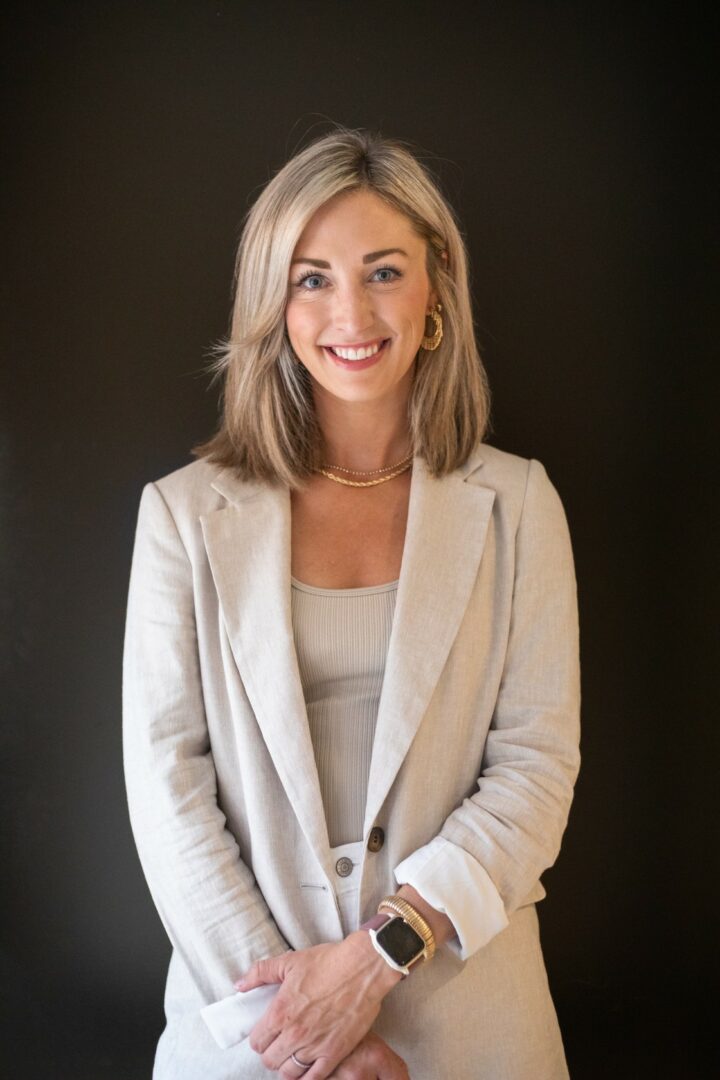We caught up with the brilliant and insightful Hallie Corbett a few weeks ago and have shared our conversation below.
Hallie, first a big thank you for taking the time to share your thoughts and insights with us today. I’m sure many of our readers will benefit from your wisdom, and one of the areas where we think your insight might be most helpful is related to imposter syndrome. Imposter syndrome is holding so many people back from reaching their true and highest potential and so we’d love to hear about your journey and how you overcame imposter syndrome.
Since finishing my master’s program in counseling, I’ve worked in the mental health field—not as a therapist, but as an operations leader who thrives when it comes to implementing and optimizing strategy and fostering innovation. My passion for helping individuals struggling with mental health challenges led me to a broader impact: improving both the clinician and client experience through streamlined processes, creative solutions, and a relentless commitment to excellence. I love being in a role where I can build something new, revamp what isn’t working, and challenge the status quo when needed.
Over the past decade, I quickly rose through the ranks, eventually becoming the COO of a mental health organization that grew to 24 corporate locations and sold over 500 franchise licenses across the country—at one point, it was the fastest-growing franchise in the nation. Through the highs and lows, long hours, victories, challenges, and invaluable lessons, I reached a point where imposter syndrome hit me hard. I questioned how I had gotten to where I was, wondering if I was too young, too inexperienced, or simply lucky. I feared that I would be “found out”—that someone would realize I didn’t belong in the rooms I was in. Despite my work ethic, my ability to build meaningful relationships, and my passion for problem-solving, doubt crept in.
When I started my consulting business, those insecurities resurfaced. I worried people would ask, Who does she think she is? Does she really have enough experience to do this? I nearly let those thoughts hold me back. But through a combination of therapy, executive coaching, networking, and intentional reflection on my accomplishments and value, I found the courage to take the leap.
Very quickly, I saw the impact I could make. Whether it was implementing a new technology solution, helping a leader navigate the stress of running a business, or restructuring an organization for growth, every small win reinforced my confidence. I realized that pushing myself into uncomfortable situations—whether speaking at an event, taking on a new challenge, or expanding my network—only made me stronger. And I also learned that nearly everyone experiences imposter syndrome. In fact, I’ve come to believe that not having it can be a disadvantage.
Imposter syndrome is a sign of self-awareness. It reminds us that we always have more to learn, and it fuels our drive to grow, improve, and do our best work. The key isn’t to let it hold us back—it’s to harness it as motivation to keep pushing forward.

Thanks, so before we move on maybe you can share a bit more about yourself?
With over a decade of experience leading healthcare operations—primarily in the mental and behavioral health space—I pair strategic expertise with my counseling background to uncover root challenges and drive meaningful change. I’ve led organizations of 400+ employees and 200+ franchise partners, overseeing every aspect of operations, including business and clinical operations, human resources, growth and development, IT, customer service (including contact centers), and revenue cycle management—at both local and national levels.
My passion for innovation and doing things differently fuels my ability to tackle complex challenges, implement tailored solutions, and build programs that balance financial performance with a retention-focused culture for healthcare professionals. As your consultant, I’ll partner with you to address operational issues, refine strategy, and provide the perspective and encouragement you need to break through barriers and achieve your vision. Let’s take your practice to the next level together.

If you had to pick three qualities that are most important to develop, which three would you say matter most?
Looking back, three key qualities have had the greatest impact on my journey: keeping an open mind, embracing tenacity and resilience, and taking calculated risks.
1. Keep an open mind—you never know what you might fall in love with. Early in my career, I never imagined I’d end up in strategy and operations, but by saying yes to new challenges, I found my passion. When you’re asked to take on a project outside of your comfort zone, resist the urge to say no too quickly. Every opportunity broadens your perspective, deepens your understanding of the business, and strengthens your ability to think strategically. Even if it’s not something you love, the experience will give you a more holistic view of how different areas of a business connect and impact each other.
Advice: Stay curious. Approach new challenges with the mindset that there’s always something to learn. The more you expose yourself to different aspects of an organization, the more valuable and well-rounded you become.
2. Tenacity and resilience are key. You will fail. You’ll make mistakes. You’ll experience setbacks. But what matters most is how you respond. Dwelling on failure doesn’t serve you—learning from it does. Humility and self-awareness are invaluable assets; they allow you to take ownership, adapt, and grow. Every challenge you overcome makes you stronger and more capable.
Advice: Instead of fearing failure, reframe it as a necessary step toward growth. Develop a habit of reflection—what went wrong, what did you learn, and how can you improve? Surround yourself with mentors or colleagues who push you to be better and help you see failure as a learning opportunity rather than a setback.
3. Take (calculated) risks. The most impactful changes don’t come from doing things the way they’ve always been done. Some of the biggest rewards in my career came from stepping outside of traditional approaches and asking, Can this be done better? Innovation requires courage, and sometimes, the greatest risk is not taking one at all.
Advice: Don’t put yourself in one lane, get too comfortable, or stop building your network. The connections you make—whether early in your career or later—could change your trajectory in ways you never expect. Seek out diverse perspectives, challenge the status quo, and always be willing to bet on yourself. The more risks you take (strategically), the more you grow.

Any advice for folks feeling overwhelmed?
When I’m overwhelmed—whether it’s juggling multiple projects with several balls in the air or tackling a complex problem that feels unsolvable—I rely on a simple but effective strategy: breaking things down into baby steps.
Instead of letting the enormity of the situation paralyze me, I break the challenge into smaller, manageable tasks, put them into a list, and cross them off one by one as I make progress.
Here’s why this works:
It makes progress visible. Even when the big picture feels overwhelming, seeing small wins builds momentum and keeps me motivated.
It keeps me focused. Instead of getting lost in the stress of everything that needs to get done, I concentrate on the next actionable step.
It creates a sense of control. Big challenges feel less daunting when they’re broken into bite-sized, achievable steps.
When I start feeling stuck or discouraged, I remind myself that progress is progress, no matter how small. Tackling challenges one step at a time keeps me moving forward, even when things feel insurmountable.
Contact Info:
- Website: https://www.halliecorbett.com
- Linkedin: https://www.linkedin.com/in/halliecorbett/



so if you or someone you know deserves recognition please let us know here.




